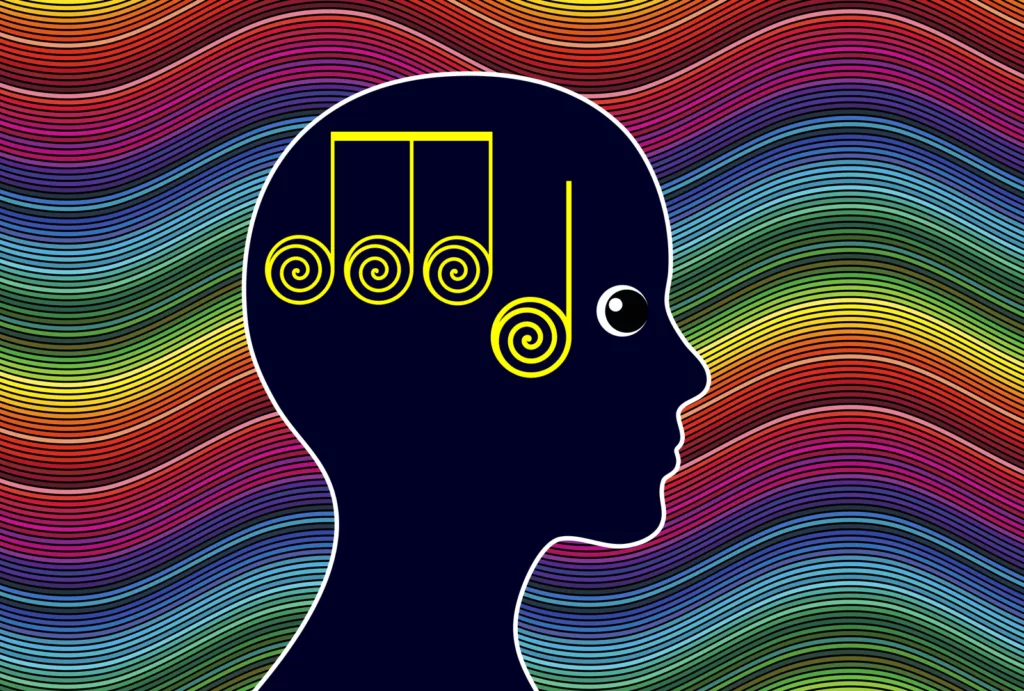Can You Meditate With Music ? The best Calm Meditation Music

You’ve likely heard the old adage, ‘music soothes the soul.’ When it comes to meditation, that may be true. Music can be a powerful accompaniment to meditative practice, providing relaxation and calming effects on both the mind and body.
Whether you’re new to meditation or an experienced practitioner, understanding how music can enhance your experience is key for creating a successful practice.
Dive into this article to learn more about the benefits of using music in your meditation practice and find out if it’s right for you.
Yes, you can meditate with music. Some people find that listening to music during meditation helps them focus and relax, while others prefer to meditate in silence. It ultimately depends on your personal preferences and what works best for you.
Key Takeaways
- Meditation with music can have psychological benefits such as stress reduction and improved memory.
- Meditation music can enhance focus during mechanical tasks and aid in addiction recovery.
- Some Christian faiths reject meditation practices from outside their traditions, while Zen meditation music promotes introspection and mindfulness.
- While meditation music can be relaxing, it may interfere with deep meditation and hinder the search for inner happiness. Silence allows for a true state of calm and balance without distractions.
Benefits of Meditation Music
Meditation music provides psychological benefits such as stress reduction and improved memory. It can help detach from surroundings and focus on thoughts and actions, while enhancing mindfulness, visualization, and contemplation.
Listening to mindful meditation music increases personal awareness and helps identify signs of stress or anxiety. Further research has found that meditating with music can improve cognitive skills like memory and focus during mechanical tasks.
Additionally, spiritual meditation promotes addiction recovery and improves mental health outcomes. Music for meditation is not traditional in Buddhist practice, but it does have the potential to provide a sense of peace and relaxation when used correctly.
It should be noted that focusing on music can distract from activities like cultivating kindness or questioning one’s experience which are essential parts of meditation. Thus, finding the right balance between silence and meditative music is key for achieving greater insight into oneself.
Cognitive Effects of Meditation Music
Listening to healing music and meditating can improve memory and cognitive skills. Cognitive effects of meditation music include increasing personal awareness, improving confidence during practice, aiding in the prevention of drug addiction relapse, and helping with focus during mechanical tasks.
How to meditate with music is a topic that has divided religious communities; for instance, some Christian faiths reject meditation practices from outside their traditions while Olivier Messiaen’s Quartet for the End of Time is explicitly Christian. Zen meditation music provides introspection and mindfulness through its influence by Zen Buddhism; Tony Scott’s Music for Zen Meditation is a notable work.
Relaxation music or free meditation music can be used to achieve desired results depending on personal preference. When considering whether one should meditate with lyrics or not, it’s important to know that mindful listening can lead to insight and deeper states regardless of genre. Ultimately, relaxation, peace, balance without distractions are key objectives when finding what works best for each individual – which may involve the use of different forms of mediation such as nature sounds or even silence instead of traditional relaxation music or mindfulness-based soundtracks composed specifically for how to meditate.
Regardless of choice, these options offer an excellent opportunity to explore one’s relationship between oneself and the world around them – leading into the discussion about religions and meditation music.
Religions and Meditation Music
Religions have varying stances on the use of meditation music. Some Christian faiths reject practices from outside their traditions, while others embrace it. Olivier Messiaen’s Quartet for the End of Time is an example of explicitly Christian meditation music. Messiaen, a practicing Catholic and church organist, created this work for his faith. However, the Catholic Church generally rejects new-age music associated with meditation.
This topic has caused much controversy within Christianity. Many believers argue that listening to or creating music can be a part of one’s spiritual journey. On the other hand, Zen Meditation Music has its own distinct genre within meditation music, influenced by Zen Buddhism. Tony Scott’s Music for Zen Meditation is a notable example. It promotes introspection and mindfulness.
Free meditation music downloads are often popular among those looking to explore what type of music they should listen to while meditating or how to meditate with music. Whether you choose nature sounds, rap tunes, R&B songs, or something else entirely, it ultimately comes down to personal preference when determining if listening to music counts as true meditation or not.
Zen Meditation Music
Try exploring Zen meditation music to deepen your mindfulness practice.
By immersing yourself in the calming yet stimulating sounds of Zen meditation music, you can find inner peace and enlightenment.
This distinct genre is influenced by Zen Buddhism, and its purpose is to promote introspection and mindfulness.
As opposed to other forms of meditation music which are often more upbeat, Zen meditation music stands out for its tranquil nature.
It’s a great way to focus on your breathing and cultivate kindness while lying down or sitting comfortably in a chair.
If you’re wondering if it’s possible to meditate with rap music or even during sleep, the answer is yes!
You can experiment with different genres as long as they energize your senses without being too aggressive or distracting.
And since there are no hard rules about how to meditate, just remember that ultimately you should choose what works best for you when it comes to finding inner peace with meditation music.
From here, consider related topics like aesthetics of music or avant-garde influences which may also provide insights into discovering enlightenment through soundscapes.
Related Topics
Exploring aesthetics of music and avant-garde influences can help you discover enlightenment through soundscapes.
Aesthetics of music is a field that investigates the beauty of certain musical works, and how it relates to philosophical concepts such as perception, emotion, and taste.
Avant-garde music is an experimental genre which often involves improvisation and uses abstract sounds or instruments.
Through understanding these two related topics, you may gain insight into meditation with music.
Introspection is also important when considering meditation with music. It’s a practice that allows for self-reflection on beliefs, thoughts, feelings, and experiences.
Meditation music has been created specifically for introspection–and its purpose is to inspire calmness and cultivate mindfulness.
Incorporating this type of music into your meditation routine can be beneficial in helping you identify signs of stress or anxiety while deepening your practice.
Moving onto modern trends in meditation with music: it’s not traditional in Buddhist practices to incorporate sound into meditating activities–but alternative health practices have made listening to soothing melodies during introspection possible.
Music has become known as ‘meditation music’ due to its ability to provide relaxation; however it can sometimes distract from cultivating kindness or questioning our experience.
Therefore the decision whether to include music depends on personal preference—so explore different options until you find what works best for you!
Meditation Music as a Modern Concept
You may have heard of meditation music, but did you know it is a modern concept? It wasn’t traditionally used in Buddhist meditation. Instead, the idea of listening to music while meditating comes from alternative health practices.
Traditionally, practitioners would simply sit in silence or with ambient background noise during their practice. Over time, however, music became known as meditation music and people began to assume that it should be listened to while meditating.
This is not necessarily the case—traditional Buddhist lineages do not use musical accompaniment in meditation. So if you’re considering using music for your own practice, it’s important to understand how it could interfere with deep meditation and what other options exist.
Interference of Meditation Music With Deep Meditation

Listening to music while meditating can interfere with deep meditation. Music is meant to be relaxing, but meditation goes beyond relaxation. Focusing on the music takes away from activities like cultivating kindness or questioning our experience. Paying attention to breathing and listening to music cannot be done simultaneously.
Meditation music provides pleasant feelings, but it can hinder the search for inner happiness. It diverts attention away from introspection and mindfulness. It prevents the ability to be at peace with silence and oneself. It increases dependency on external stimuli for comfort or satisfaction.
Moving beyond the interference of music, it’s important to consider that it can also become part of a meditative practice in its own right if taken seriously enough. Switching off distractions and fully focusing on the music can enhance the experience, leading to self-discovery and insight transitionally moving into an exploration of ‘music as a form of meditation’.
Music as a Form of Meditation
Treating music as a meditation object can lead to an experience of dhyanas. Switching off distractions and fully focusing on the music is key. Listening can reveal hidden treasures, letting go of racing thoughts and achieving inner peace. Activities like walking or washing dishes can also be forms of meditation. Attention to breathing and listening cannot be done simultaneously, so purposeful disconnection from external stimuli is essential in order for the music to become a meditation object itself.
| Benefits | Challenges |
|---|---|
| Focus | Distraction |
| Relaxation | Not traditional Buddhist practice |
| Self-discovery | Difficulty tuning out music |
| Insight | Artificial inflation of mood |
Frequently Asked Questions
How Long Should I Meditate With Music?
Meditating with music can be a great way to relax and reduce stress. How long you choose to meditate is up to you, but keep in mind that the benefits of meditating increase over time. Start with shorter sessions and gradually increase the length as you become more comfortable.
Are There Any Health Benefits to Meditating With Music?
Yes, there are many potential health benefits to meditating with music. Listening to calming melodies can reduce stress levels and increase mindfulness. It can also help you focus, slow your breathing, and lift your mood. Different genres of music offer unique experiences that can be tailored to suit individual preferences.
Is There Any Specific Type of Music That Is Better for Meditation?
Yes, certain types of music are better for meditation. Music that is calming and relaxing such as classical or nature sounds can be beneficial. Additionally, binaural beats and ambient music can help you focus on your inner self during meditation. Ultimately, it’s important to choose the type of music that works best for you!
How Can I Properly Use Music for My Meditation Practice?
Choose music that resonates with you and sets the tone for your practice. Listen to it mindfully while focusing on your breathing. Let go of distractions and let the music guide you through an introspective journey, unlocking a deeper understanding of yourself.
Is It Better to Meditate With Music or in Silence?
It really depends on your individual preference. Music can help some people focus during meditation, while others may find it distracting. Experiment to find out what works best for you – silence or music – and enjoy the journey of self-discovery!
Conclusion
Meditating with music can be an incredible experience. It allows you to access a deeper layer of yourself that traditional silence-based meditation can’t offer. Whether it’s ambient melodies, upbeat rhythms, or nature sounds, music has the potential to open up unique pathways of understanding and relaxation.
Ultimately, it’s up to you to decide what works best for your own practice. But if you’re willing to take the plunge and explore the potential of meditating with music, you might just find yourself soaring higher than ever before!






